Dubai Islamic Bank's Impact on Zahia Development
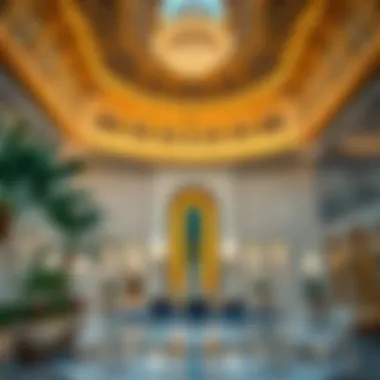
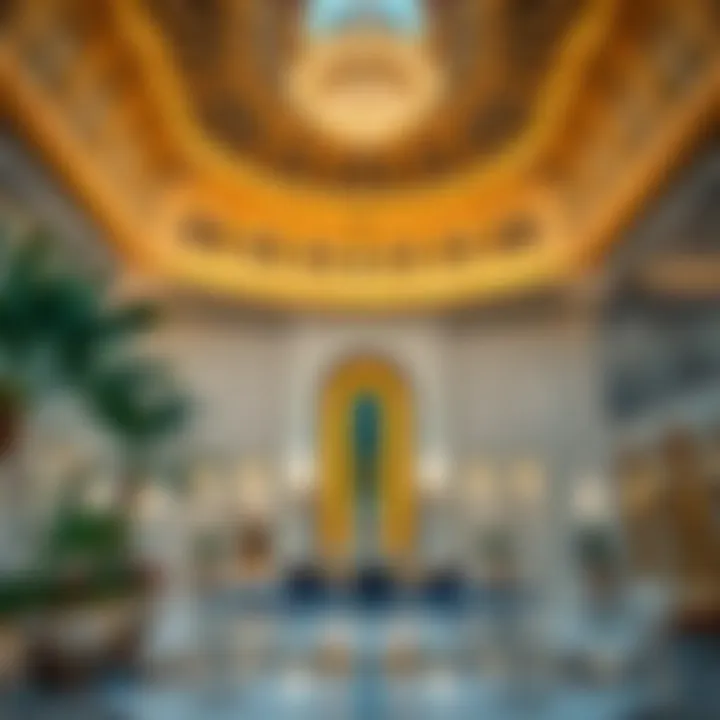
Intro
Dubai, a city that seamlessly marries tradition with modernity, stands as a beacon in financial innovation and urban development. Among its many landmarks, the Zahia Development has become synonymous with the aspirations of contemporary living. This ambitious residential project has captured attention not only for its architectural appeal but also for its backing by the Dubai Islamic Bank. In this narrative, we dive into how the bank is reshaping the landscape of Zahia while integrating Islamic finance principles into its strategies.
As the real estate market evolves, understanding the dynamic interplay between financial institutions and property developments is critical. That’s where Dubai Islamic Bank comes in — a key player in shaping the city's economic future. The journey of the bank, joined at the hip with Zahia, reveals a tapestry of community impact, investment opportunities, and market trends that set the stage for more than mere property transactions.
With such a rich backdrop, this article will delve into the following key areas outlined in the abstract:
- The historical context of Dubai Islamic Bank
- The significance of the Zahia residential project
- The intricate connection between Islamic finance and modern urbanization
- Emerging trends in the real estate market and what they mean for various stakeholders
Now let’s roll up our sleeves and explore these elements in greater detail.
Prelude to Dubai Islamic Bank
Dubai Islamic Bank is not just a bank; it represents a pioneering movement within the global banking industry that intertwines Islamic finance principles with progressive economic strategies. As one of the leading banks in the UAE and notable around the world, its operations have far-reaching implications for investors and stakeholders, especially regarding groundbreaking projects like the Zahia development. Understanding this bank's unique characteristics—grounded in Sharia-compliant finance—provides essential insight into the broader landscape of Dubai's real estate market.
History and Foundation
Established in 1975, Dubai Islamic Bank was founded upon the principles of ethical finance and the belief that financial systems can be both moral and productive. Its inception marked a significant turning point in the UAE, offering an alternative model to conventional banking systems that often put profit above morality. The bank’s foundation was built on a vision by key figures such as Sheikh Ahmed bin Saeed Al Maktoum, who recognized the potential for Islamic banking in the rapidly evolving economy of Dubai. Over the decades, Dubai Islamic Bank grew with the nation, shaping its framework while adhering steadfastly to Islamic values. Its successful establishment helped lay the groundwork for other Islamic financial institutions within and beyond the Gulf region.
Financing Principles of Islamic Banking
The principles guiding Dubai Islamic Bank set a unique tone in the industry. At the core of its operations lies the prohibition of riba—interest—which marks a clear departure from conventional banking practices. Instead, the bank engages in profit-sharing models like Mudarabah and Musharakah, where the bank and its clients share in the risks and rewards of investment ventures. This ensures that all financial transactions are equitable and adhere to ethical standards. Furthermore, the bank promotes investments in halal activities, steering clear of sectors such as alcohol, gambling, and anything deemed harmful to society.
"Islamic banking fosters a sense of community and shared responsibility between the bank and its clients, encouraging sustainable growth."
By aligning itself with these principles, Dubai Islamic Bank has attracted a diverse clientele, including those seeking ethical investment opportunities.
Current Position in the Banking Sector
Today, Dubai Islamic Bank stands as a pillar within the banking landscape of the UAE. It boasts an extensive branch network, comprehensive digital banking solutions, and a robust financial portfolio that includes retail banking, investments, and asset management. Its strategic alliances and partnerships have fortified its position amidst an increasingly competitive market. The bank has embraced technological advancements, facilitating seamless banking experiences for customers, which speaks volumes about its adaptability in a rapidly evolving economic environment. Furthermore, its focus on community development through financial products tailored for social impact sets it apart from traditional banks, significantly appealing to socially conscious investors.
In summary, understanding Dubai Islamic Bank's history, financing principles, and its current standing in the banking sector provides vital context for investors, realtors, and potential buyers. As we explore the intertwining of Islamic finance with contemporary developments like Zahia, one can truly appreciate the impactful role this institution plays in shaping Dubai’s economic future.
Overview of Zahia Development
The Zahia development project stands out as a significant venture in Dubai's growing real estate landscape, attracting attention from both local and international investors. This project embodies a blend of modern living and sustainable practices, making it not just a residential area but a community rooted in innovative design and strategic planning. The significance of Zahia lies in its focus on quality of life and the unique offerings it brings to the market, appealing to a wide range of demographics.
Location and Design Elements
Situated in the heart of Dubai, Zahia is strategically placed to offer easy access to key amenities and transport links. Its design principles incorporate a commitment to modern aesthetics while embracing traditional Arabian influences. Streets are lined with lush landscaping and integrated outdoor spaces, promoting a strong sense of community.
- Proximity toKey Locations: Zahia is conveniently located near educational institutions, healthcare facilities, and leisure hubs such as malls and parks.
- Architectural Details: Buildings within Zahia are designed with an eye for elegance and functionality. They showcase large windows for natural light, open floor plans, and high-quality materials, ensuring residents enjoy both comfort and style.
This thoughtful design approach not only enhances residential appeal but also contributes to community interaction, fostering an atmosphere where neighbors can become friends.
Target Market and Demographics
The target market for the Zahia project is quite diverse, ranging from young families to professionals and retirees. This wide demographic focus indicates a well-researched understanding of current market needs.
- Families Seeking Quality Living: Many buyers are drawn to Zahia for its family-friendly environment, safety measures, and access to schools and play areas.
- Young Professionals: These individuals appreciate the urban feel and connectivity, which offers a balance of work and leisure.
This strategic targeting ensures that Zahia is not just a place to live but a thriving community that caters to various lifestyles and aspirations, encouraging a mixed demographic that enhances the neighborhood's allure.
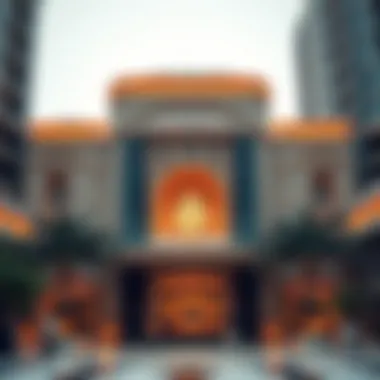

Sustainability Features
In today’s environment, sustainability is paramount, and Zahia is keenly aware of this reality. The project incorporates several sustainability features that underscore its commitment to environmentally-friendly practices.
- Energy Efficient Designs: Buildings are equipped with solar panels and energy-efficient appliances, reducing the overall carbon footprint.
- Water Conservation Measures: The use of smart irrigation systems and rainwater harvesting showcases the project's dedication to responsible water management.
- Green Spaces: Parks and green belts not only enhance aesthetic appeal but also promote biodiversity and offer spaces for recreation and relaxation.
These features reflect a shift in how developments can contribute positively toward the environment while enhancing the living experience. Zahia is setting a new standard for what it means to be an urban residential area in a modern world.
"Zahia represents a forward-thinking approach to urban living, embodying a blend of community spirit, modernity, and sustainability that is crucial for future developments in Dubai."
Alignment of Dubai Islamic Bank with Zahia
Understanding the alignment between Dubai Islamic Bank and Zahia development carries substantial significance in both financial and urban planning contexts. This synergy exemplifies how innovative financing solutions can empower large-scale projects while aligning with community needs and ethical standards. As the Zahia development seeks to establish itself as a premier residential destination in Dubai, the backing of Dubai Islamic Bank plays a pivotal role in ensuring its financial robustness.
Investment and Financing Approaches
Dubai Islamic Bank adopts various investment and financing strategies tailored specifically for Zahia development, ensuring that funds are allocated effectively while adhering to Sharia principles.
- Islamic Financing Models: The bank primarily employs profit-sharing arrangements and leasing agreements that minimize risk for investors and align financial activities with Islamic ethical standards. It’s not just about profit; these models ensure the money is utilized for ventures with tangible community benefits.
- Project Financing: As Zahia is an extensive project, financing comes in phases. The bank’s staged disbursement of funds allows for flexibility, catering to the changing demands of the development timeline while enabling careful monitoring of both expenditure and project progression.
- Partnerships with Developers: The collaborative approach allows for shared vision and resources, increasing the overall viability of the project. This way, both the bank and the developers can address barriers quickly as they arise.
Role in Community Development
The impact of Dubai Islamic Bank extends beyond mere financial transactions; it deeply influences community development within and around Zahia.
- Local Job Creation: By engaging in funding initiatives, the bank indirectly contributes to job creation. Construction and management roles associated with Zahia lead to numerous employment opportunities for locals, which is crucial in a rapidly developing emirate.
- Community Services Investment: Profits derived from the Zahia project can be funneled back into local community services, such as parks, educational facilities, and healthcare initiatives, thus creating a holistic development model.
- Cultural Integration: The bank prioritizes projects that resonate with local culture, enhancing community ties and promoting a sense of belonging among residents of Zahia. The architectural norms and community spaces are reflective of Emirati heritage, fostering a local identity.
Case Studies of Successful Projects
To illustrate the partnership between Dubai Islamic Bank and Zahia, several successful case studies provide insights into how financing can lead to thriving projects.
- Zahia's Phase One Launch: Financed by Dubai Islamic Bank, this phase saw the completion of residential units and community amenities within the planned timeline. The structured financing allowed for timely execution, ultimately boosting buyer confidence in the development.
- Retail Spaces Development: Utilizing innovative leasing solutions, the bank financed retail spaces within Zahia. This not only added commercial vibrancy but also attracted notable businesses, further diversifying economic activities in the area.
- Sustainability Initiatives: A notable project was the investment in eco-friendly infrastructure. With Dubai Islamic Bank’s backing, Zahia incorporated green technologies in construction, showing practical applications of Islamic finance principles aiming for sustainability.
"The financial amalgamation between Dubai Islamic Bank and Zahia represents a blueprint for ethical investment in development, merging community needs with fiscal responsibility."
In keeping with the traditions of Islamic finance, these successful instances highlight the harmonious relationship formed between finance and community-building in Zahia, making it a noteworthy example in Dubai’s ever-evolving real estate sector.
Market Trends in Dubai Real Estate
Understanding the market trends in Dubai real estate is crucial for anyone involved in the sector. It provides insights into how the market has evolved, the dynamics governing property values, and the shifting demographics influencing development. As investors and stakeholders look to assess opportunities, grasping these trends can make a significant difference in decision-making processes. Notably, Dubai has consistently showcased itself as a vibrant hub for international investment. The factors at play are numerous, encompassing economic indicators, social shifts, and the rising demand for sustainable living.
Historic Property Value Trends
Historically, Dubai's property market has experienced significant fluctuations, mirroring global economic conditions largely. After the burst of the real estate bubble in 2008, prices dropped considerably, leaving many investors in a lurch. However, the market rebounded with vigor, especially post-2012, driven by government initiatives and a surge in tourism. Recent data indicates that property values have been stabilizing, showing a modest increase in demand, particularly in urban areas. Investors now focus not only on capital appreciation but also on rental yields, which, according to the Dubai Land Department, hover around 7-8% for residential properties.
- From 2008 to 2012: A major downturn in property values led to a decline of up to 50% in some areas.
- Post-2013: The market began a steady recovery with an increased number of transactions.
As a foundational element, understanding these historical trends prepares investors to navigate the market with a clearer perspective and avoid repeating past mistakes.
Emerging Neighborhoods
The geographical landscape of Dubai is continually evolving. Emerging neighborhoods like Dubai Marina, Dubai Creek Harbour, and the newer developments in the Dubai South area are gaining traction among buyers and investors. These areas are characterized by a unique blend of modern conveniences and access to public transport links, enhancing their appeal to younger families and professionals.
Several factors contribute to the rise of these neighborhoods:
- Infrastructure Development: Initiatives such as the Dubai Metro expansion and improved road networks play a pivotal role.
- Community-Centric Designs: These areas often boast designed community spaces that emphasize social interaction, an attractive proposition for many.
- Affordable Options: Compared to the high-end properties in areas like Downtown Dubai, emerging neighborhoods present more accessible price points, catering to first-time buyers.
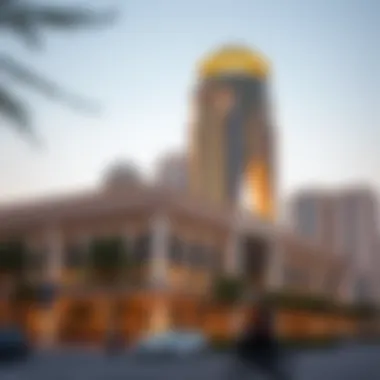
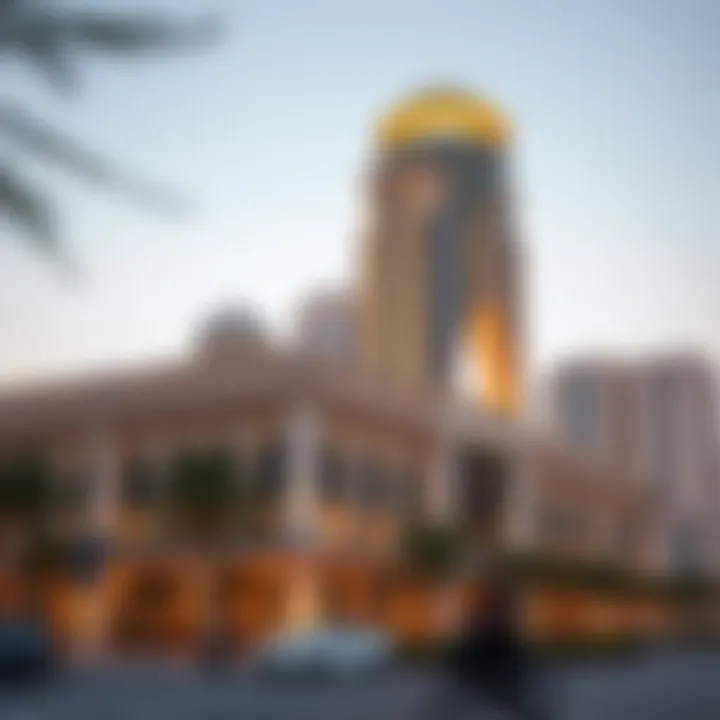
In turn, these growing communities create a ripple effect on Dubai's overall real estate landscape, influencing demand and property values across the board.
Impact of Foreign Investment
Foreign investment has been a back-bone in bolstering Dubai's real estate market. The introduction of favorable policies, such as long-term visas for investors and value-added benefits for expatriates, has led to a surge in capital inflow. The Dubai Land Department reported a 23% increase in foreign investment in 2021, underscoring the global interest.
Some key considerations regarding the impact of foreign investment include:
- Market Stability: A diverse base of foreign buyers helps stabilize the market and mitigates risks associated with economic downturns.
- Cultural Enrichment: The infusion of different cultures leads to more cosmopolitan communities and varied property types, attracting global tenants and buyers.
- Regulatory Applications: The government is continually adjusting regulations to accommodate and protect these investments, further encouraging growth.
Thus, as Dubai positions itself on the global stage, understanding foreign investment dynamics offers substantial insights into market behavior and future opportunities.
The interaction of these market trends and dynamics creates an evolving landscape where investors must stay informed to capitalize on the opportunities presented.
Investment Opportunities in Zahia
Zahia Development stands as an epitome of progress in Dubai’s real estate market, presenting a wealth of investment opportunities that cater to diverse needs. Its significance within this article lies not only in its commercial prospects but also in the way it exemplifies the synergy between innovative urban development and Islamic banking principles. Investors looking to tap into this burgeoning landscape can expect substantial benefits, as the strategic location and design elements of Zahia make it a preferred choice among homebuyers and businesses alike.
Residential Options Available
In Zahia, homebuyers will find an array of residential options that prioritize both comfort and modern living. Properties range from stylish apartments to lavish villas, reflecting the unique architectural vision of this development. Notably, many homes feature amenities geared towards family living, such as parks, gyms, and recreational areas. The pricing strategy is also worth noting; various financing packages have been designed to cater to different financial capabilities, which is especially facilitated by the financing solutions offered through Dubai Islamic Bank. This accessibility allows potential homeowners to consider Zahia not just as a living space, but as a significant asset in their investment portfolio.
- Types of residential properties include:
- Luxury villas with private gardens
- Modern apartments suitable for young professionals
- Family-friendly townhouses with community spaces
The appeal of these residential areas is heightened by their proximity to essential services such as schools, shopping centers, and healthcare facilities. These factors can significantly elevate long-term property values, making Zahia an attractive option for investors keen on capital appreciation.
Commercial Ventures and Partnerships
Zahia offers not just residential investment avenues but also significant commercial commercial ventures poised to flourish in this dynamic market. Eligible investors might consider stakes in retail, hospitality, and office spaces, all harmoniously integrated into the development. By fostering partnerships with local and international businesses, Zahia opens doors to a variety of commercial opportunities that could yield strong financial returns.
- Commercial opportunities include:
- Retail spaces designed for flagship stores
- Hospitality developments aimed at tourists and business travelers
- Office spaces in a booming business district
Moreover, the supportive infrastructure and favorable governance surrounding Dubai Islamic Bank further enhance these prospects. Investing in Zahia’s commercial sector means entering a forward-thinking ecosystem that aligns with global market trends.
Long-Term Value Propositions
When it comes to long-term value propositions, Zahia Development stands out as a shining example. Not only does it offer a modern living environment, but it also embraces sustainability practices that are increasingly sought after. As the demand for eco-friendly living spaces rises, properties in Zahia are positioned to retain and grow in value over time.
"Investing in urban developments like Zahia, especially with its alignment to sustainable living, signifies not just economic potential but a commitment to future generations."
In addition, the integration of technological advancements, such as smart home features, makes this development attractive in a tech-savvy market. Investors can thus forecast significant appreciation in property value as urban living trends evolve.
Challenges and Risks in the Current Market
In any bustling environment like Dubai’s real estate market, challenges and risks tag along like shadows, forming an essential part of the narrative. For investors and stakeholders engaged with the Dubai Islamic Bank and the Zahia development, considering these challenges isn’t just recommended—it’s vital. Understanding the various intricacies of market fluctuations, regulatory norms, and supply levels is key to making informed financial decisions. This section will delve into the core issues that can significantly affect investments and overall market stability, arming you with the insights necessary to navigate this complex landscape.
Economic Fluctuations
Economic fluctuations are the peaks and valleys of any market. In Dubai, where the economy swells and contracts with the tides of global trade and oil prices, these fluctuations can hit harder than a desert storm. The influence of global economic events, like shifts in oil prices or the performance of key trading partners, reverberates across the banking and real estate sectors.
For example, when oil prices dip, the money flow into Dubai's economy can dry up quicker than a mirage. This impacts the demand for residential and commercial spaces, which in turn affects the financing capabilities of banks such as Dubai Islamic Bank. Investors must keep a close ear to the ground, monitoring global economic indicators and trends in order to gauge potential impacts on their investments in Zahia and beyond.
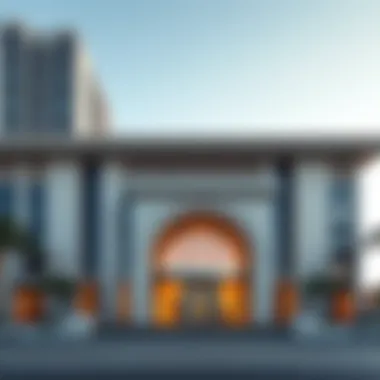
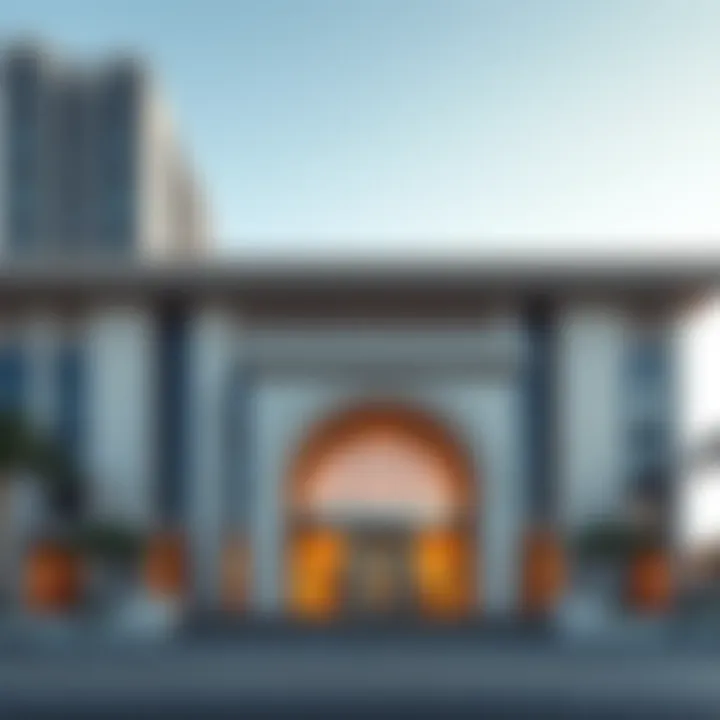
"A keen sense of timing and awareness of economic conditions can often be the difference between a thriving investment and a financial sinkhole."
Regulatory Changes
Regulatory frameworks evolve continuously, and staying ahead of these changes can feel like trying to catch smoke with bare hands. In Dubai, regulations impact various aspects of the property market—from ownership laws to financing options provided by banks. These laws can alter abruptly in response to shifting economic climates or geopolitical situations.
For instance, recent guidelines launched by the Dubai Land Department aimed at fostering foreign investments could offer enticing opportunities, but changes to these laws might come unannounced. Investors need to scrutinize these developments closely, because an overlooked regulation could suddenly change the landscape of their financial commitments or investment prospects. Aligning with a bank known for its adaptability, like Dubai Islamic Bank, can be a safety net when these turbulent changes occur.
Saturation of Supply
Just as too many cooks can spoil the broth, an oversaturation of property supply can lead to a spoiled market. In recent years, Dubai has seen a boom in construction, with numerous developments, including Zahia, launching at an impressive pace. While a plethora of options might appear beneficial to buyers and renters at first glance, it poses a significant risk of overdevelopment.
When supply outpaces demand, property values may begin to slip, causing stress for investors who have staked their fortunes in such projects. New buyers might find themselves bargaining for long-term value, as demand for properties potentially wanes. Moreover, banks like Dubai Islamic Bank must assess their exposure to the residential market critically, ensuring they remain insulated from any adverse effects stemming from market saturation.
Future Outlook for Dubai Islamic Bank and Zahia
The future of Dubai Islamic Bank and the Zahia development is promising, weaving together financial innovation and urban growth. This section explores how these elements will shape the broader landscape of Dubai's real estate sector.
Innovations in Islamic Banking
Dubai Islamic Bank has always been at the forefront of adopting innovations that not only enhance its banking services but also align with the principles of Islamic finance. Blockchain technology is making waves, providing enhanced security and faster transactions. For example, smart contracts could automate various banking processes, ensuring that all transactions adhere to Islamic principles without compromising efficiency.
Additionally, the rise of digital banking platforms allows for greater accessibility for clients. Mobile apps designed for seamless user experiences help customers manage their finances more effectively, thus addressing a growing demand for convenience in banking. Moreover, the focus on sustainable investments is rising, as more products align with ethical financing, reflecting the societal trend towards responsible investing. The essential shift in consumer behavior emphasizes the importance of transparency and accountability.
Projected Growth of Zahia
As a multi-functional community, Zahia stands as a testament to Dubai's vision for modern urban living. With its planned residential spaces, retail locations, and integrated public services, it's geared for substantial future growth. Analysts predict an influx of residents due to its attractive location and thoughtfully designed community amenities. This area is particularly appealing to young professionals and families seeking a balanced lifestyle—an environment that prioritizes convenience, green spaces, and community engagement.
Some of the highlighted features driving growth trends include:
- Affordable housing units catering to mid-income families.
- Eco-tourism initiatives that promote sustainable living.
- Strategic partnerships with local businesses to enhance economic activity.
The cumulative impact of these factors sets Zahia up for a bright trajectory within the real estate market.
Impact of Global Trends
Meanwhile, global economic conditions and demographic shifts continue to play a vital role in shaping local markets, including Zahia's. Emerging trends indicate that remote work and digital nomadism will drive renewed interest in Dubai’s real estate. With an increased number of individuals seeking flexibility in their living arrangements, Dubai is well-positioned to accommodate this shift, offering a tax-free environment, world-class amenities, and a multicultural atmosphere.
Additionally, as environmental consciousness grows globally, developments like Zahia can benefit from the rising demand for green spaces and eco-friendly designs within urban environments. Policies aimed at encouraging sustainable practices in construction and landscaping are shaping the future, aligning with international standards.
"As the world navigates economic transitions, Dubai remains a robust contender in the global market, buoyed by its adaptability and strategic vision."
In summary, the intertwined futures of Dubai Islamic Bank and Zahia suggest significant advancements guided by innovation, demand for ethical investments, and responsiveness to global trends. Stakeholders are advised to stay informed, as the evolving landscape presents both opportunities and challenges in this dynamic market.
End: Integrative View on Development and Finance
The topic of integrating finance with developmental projects like Zahia under the auspices of Dubai Islamic Bank reflects a significant paradigm shift in how urban infrastructure is funded and managed. It highlights the pivotal role that financial institutions play in not only underpinning economic growth but also in shaping the quality of community life. This section consolidates various elements discussed throughout the article, emphasizing the multifaceted benefits this integration provides to stakeholders involved.
Summary of Insights
Throughout this exploration, several key insights have emerged:
- Financial Strategies: Dubai Islamic Bank employs innovative financial mechanisms that align with Islamic principles, allowing for substantial investments in developmental projects without the pitfalls of traditional financing methods.
- Community Impact: Zahia development is not merely a physical space; it aims to foster a living environment that embodies sustainable practices and caters to the needs of diverse demographics. The bank's involvement ensures that such initiatives can flourish.
- Market Trends: By linking up with pivotal developments, Dubai Islamic Bank positions itself strategically within an evolving real estate market. This not only enhances its portfolio but, importantly, provides potential investors with insights into emerging trends that signal growth opportunities.
- Sustainability: The sustainability features in Zahia reflect a broader understanding of what it means to invest in tomorrow's communities. This approach boosts the attractiveness of Dubai's real estate, making it a favorable destination for both local and foreign investors.
"The intersection of finance and development illustrates that with the right backing, urban spaces can thrive responsibly and economically, paving the way for sustainable growth."
Considerations for Investors
Investors looking at the intersection of finance and development should bear several vital factors in mind:
- Evaluation of Risk vs. Reward: Any investment, especially in a project of this magnitude, carries inherent risks. Due diligence is crucial to weigh potential returns against the economic realities of the market.
- Understanding Islamic Finance: For those unfamiliar with Islamic banking principles, a clear understanding is essential. Investments should comply with ethical standards and financial regulations that govern this particular banking sector.
- Market Trends: Staying attuned to fluctuating market trends can make or break an investment. Analyze data points such as demographic changes, infrastructure projects, and even global economic shifts.
- Regulatory Compliance: Investors need to be aware of both local and international regulations that can impact investment decisions. Collaborating closely with legal advisors is a must to navigate complex landscapes.
- Ethical Impact Investing: The growing trend toward sustainability and social responsibility in investing cannot be overstated. Investors who consider the ethical dimensions of their investments can often tap into a new wave of support that drives both profitability and positive community outcomes.
In summary, by combining the financial prowess of Dubai Islamic Bank with the innovative vision of the Zahia development project, stakeholders have the opportunity to not only push for fiscal growth but also help shape a better living environment for current and future generations. With careful planning and consideration, investors can become a part of this groundbreaking approach to urban development.







